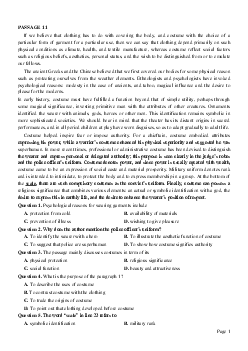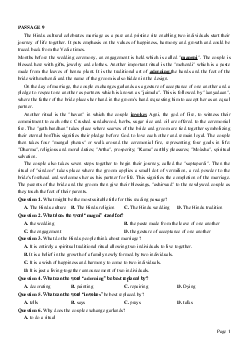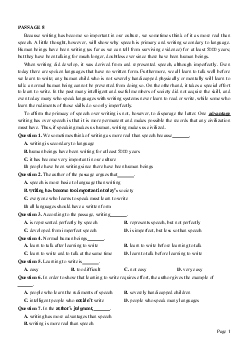

Preview text:
PASSAGE 22
With the leaps and bounds being made in technology, a robotic future isn't too far out of reach,
especially given the amount of jobs ripe to be replaced by computers. For example, most people carry
around technology in their pockets that duplicates work done, or once done, by actual people. The emails
and Facebook posts people send were once mailed out and delivered to individuals. Google search has
nearly eliminated the need for encyclopedias and libraries.
While many don't notice this seemingly benign form of computerization, machines may soon be taking
over some well-known fields and jobs. A new study, titled "The Future of Susceptible Are Jobs to
Computerization?" calculated how likely individual jobs were to be filled by computers based on how
often they required clever solutions, personal interaction and negotiation. Telemarketers are most likely to
be replaced by machines, Quoctrung Bui of NPR reported. While this is no surprise given the rise of
"robocalls,"the Bureau of Labor Statistics reported that as of 2014 there were 234,520 telemarketers in the U.S.
On the other hand, mental health and substance abuse social workers only have a 0.3 percent chance of
computerization because their job requires a degree of cleverness and personal interaction computer
cannot compete with. Teachers, doctors and nurses, management and artists were also less likely to be
replaced compared to those in cleaning, maintenance, transportation and manufacturing.
In order to prepare for the potential for computerization, some colleges and universities across the
country are introducing new programs and teaching styles that will create more flexible graduates who
may be able to better navigate an increasingly automated world. Harvard's program in general education
requires students to take courses outside the realm of their programs in the hopes of broadening their
education and many other schools are taking similar approaches, Robert J. Shiller reported for The New
York Times. Shiller said the two ways to approach this issue would be to give students "general, flexible,
insight-bearing human learning" or to turn to a more business-oriented and real world teaching process
that develops more entrepreneurs. By connecting all disciplines to possible areas of entrepreneurship and
business, Shiller suggests future employees may be able to outsmart the robots.
"Perhaps we should prepare students for entrepreneurial opportunities suggested by our own
disciplines," he said. "Even departments entirely divorced from business could do this enterprises,
nonprofits and activities in which students can later use their specialized knowledge."
Question 1. What sentence is NOT true about technology in paragraph 1?
A. People can copy the work done by other people.
B. People can use technology to send mails or posts to others.
C. All jobs will be replaced by computers.
D. People have used Google search instead of encyclopedias and libraries.
Question 2. What is the job or field likely taken over by machines in paragraph 2? A. telemarketing B. computerization C. interaction D. negotiation
Question 3. The following jobs are the ones rarely replaced by computers, EXCEPT A. teachers B. doctors and nurses C. artists bool D. cleaners
Question 4. What is the reason why computers have little chance to replace mental health and substance abuse social workers?
A. Because computers do not have degrees required like people. Page 1
B. Because computers are not as clever and interactive as people are.
C. Because computers are cleverer and more interactive than people are.
D. Because computers are likely replaced the jobs like cleaning, maintenance, transportation and manufacturing.
Question 5. What does the paragraph 4 mainly discuss?
A. The new programs and teaching styles.
B. Two ways to broaden students' education.
C. The preparation for computerization.
D. The disciplines of entrepreneurship and business.
Question 6. The word "navigate" in paragraph 4 is closest in meaning to A. control B. orient C. direct D. manage
Question 7. What does the word "divorced” in paragraph 5 mean? A. gathered B. divided C. equipped D. separated
Question 8. What does Shiller suggest in the last paragraph?
A. Students should be prepared for the opportunities in business.
B. Every department should require enterprise, nonprofits and activities to use students' knowledge.
C. Students should do the jobs their disciplines suggested
D. Students should use their specialized knowledge later. ĐÁP ÁN 1-C 2-A 3-D 4-B 5-C 6-C 7-D 8-A Page 2




